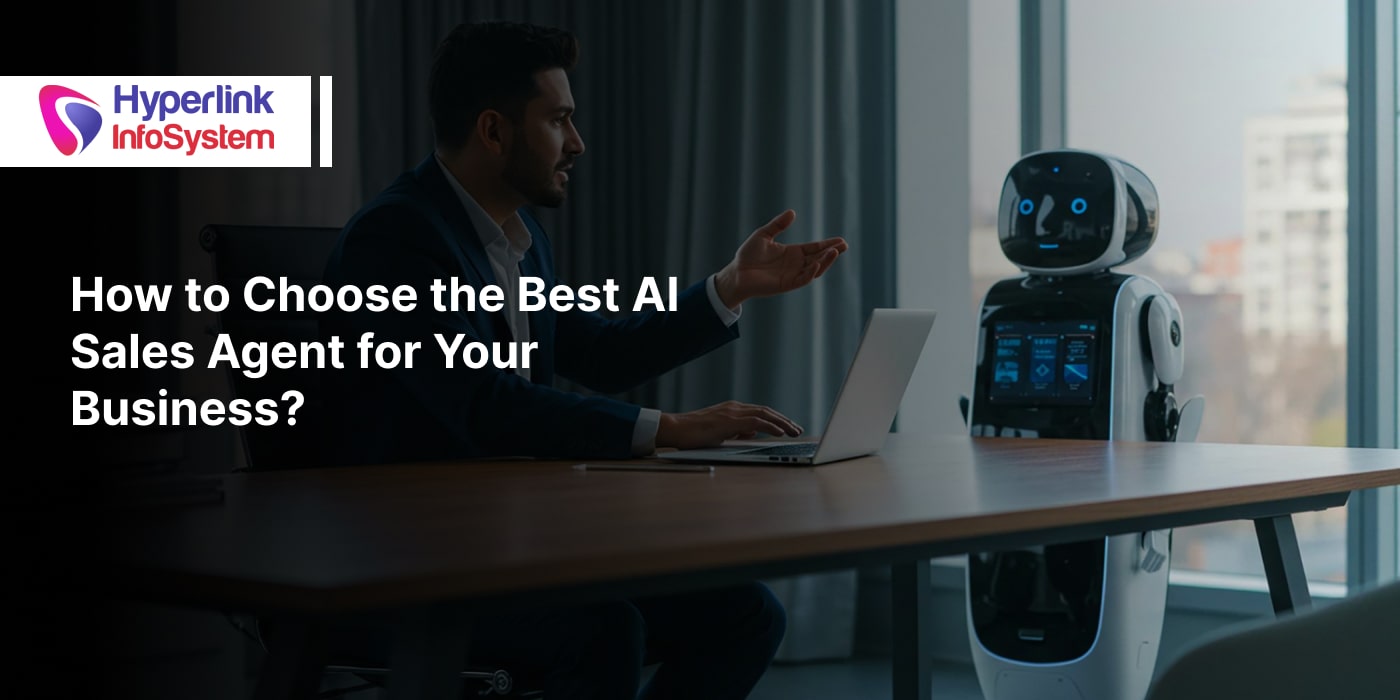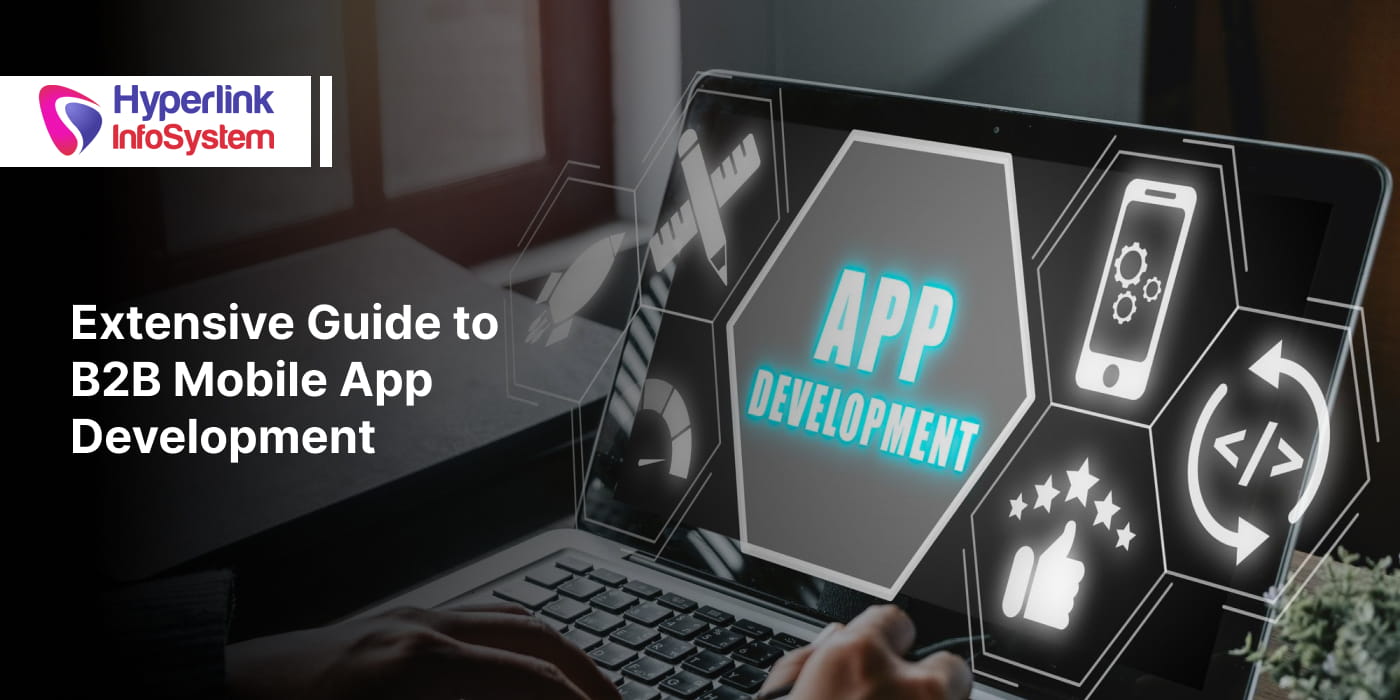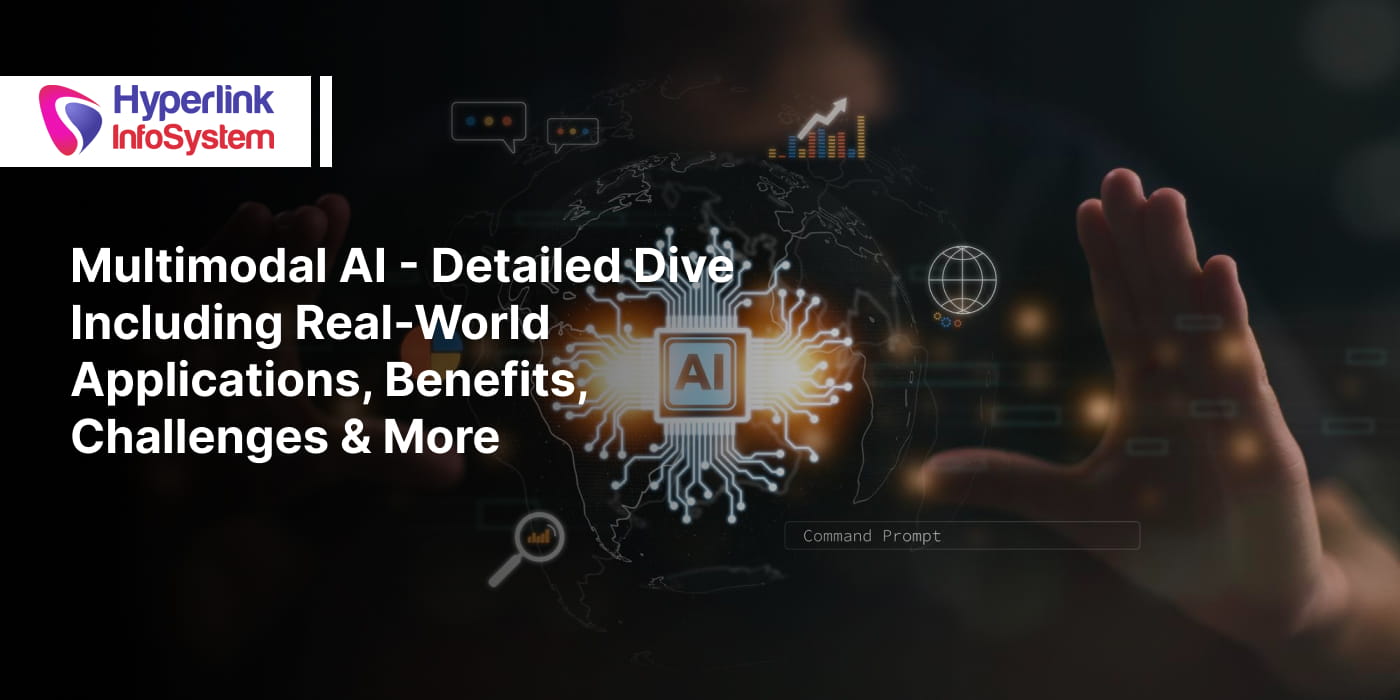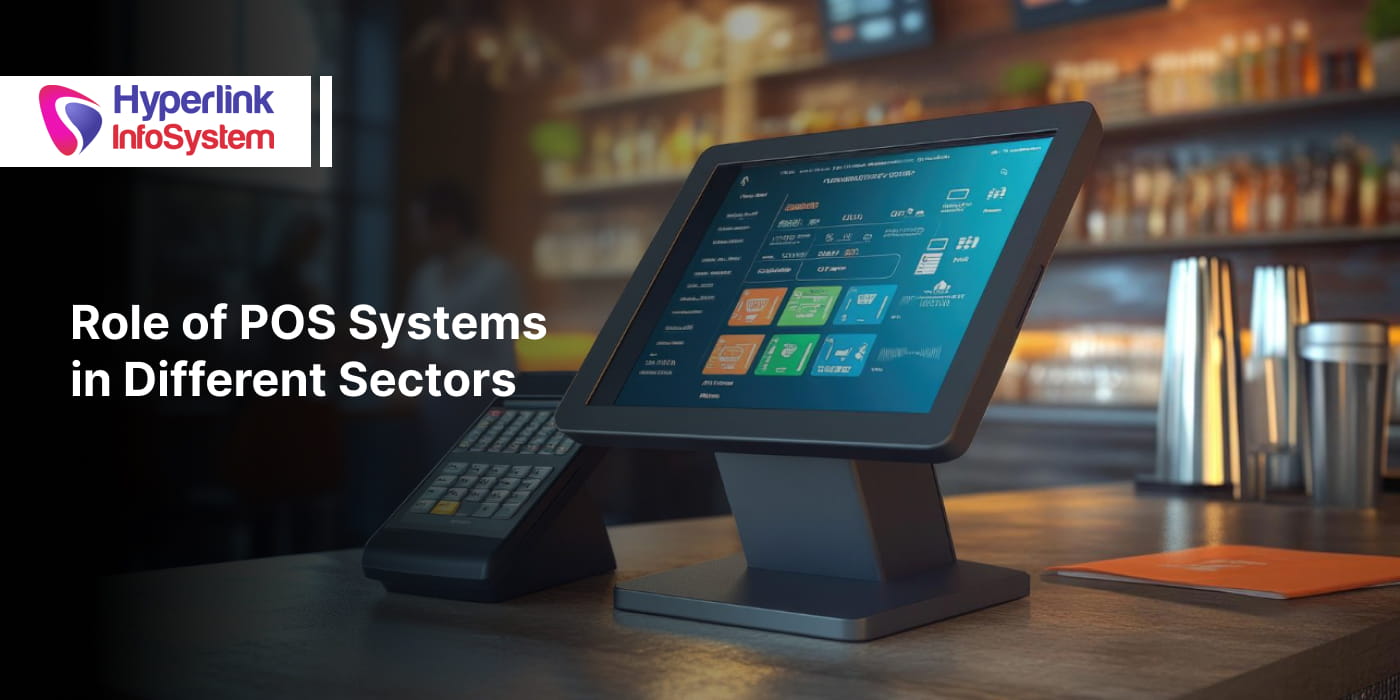How to Choose the Best AI Sales Agent for Your Business?
Sep 2025

AI has woven itself into the fabric of our daily lives. Whether it’s through large language models, social media, voice assistants, chatbots, or even our home gadgets, AI is everywhere. What’s particularly fascinating is how AI sales assistant software is becoming a staple in sales operations. According to research, AI-powered sales efforts generate over 400% ROI.
The AI market for sales and marketing is expected to grow from $57.99 billion in 2025 to $240.58 billion by 2030. For years, we believed that sales relied heavily on emotional connections and that technology couldn't bridge that gap. So, how is AI shaking things up in the sales arena? From lead generation to qualifying prospects, and even sales forecasting and analytics, AI is turning the sales process into something dynamic and actionable.
The buzz around AI sales agents is real, but with so many options available, picking the right one can be a bit of a puzzle for businesses. The costs for these AI sales assistants can vary widely, ranging from a few hundred to several thousand dollars, and making the wrong choice could lead to more problems than solutions. In this blog, we’ll dive into the various types of AI sales agents, their benefits, real-world applications, challenges, and much more. So, let’s dive in without further delay.
What is an AI Sales Agent?
Sales is not a walk in the park. Figuring out who your target audience is, sparking their interest, sealing the deal, and keeping customers coming back all demand a solid and thoughtful strategy. That’s where an AI sales assistant comes in to streamline these tasks. It’s important to realize that AI isn’t just one thing; it’s a blend of various technologies like machine learning, natural language processing, predictive analytics, and systems that can make decisions on their own.
These AI sales agents can handle tasks much quicker and more efficiently than humans, especially when it comes to data-heavy and repetitive jobs. Of course, humans are essential for tasks that require emotional intelligence and building relationships, but AI sales agents can accomplish a lot in a shorter amount of time. Here are a few examples.
- AI chatbots work 24/7/365, with no physical, time, or location limitations.
- Handles thousands of conversations simultaneously.
- Learns continuously from feedback, data, and patterns to improve itself.
- Analyze data across multiple touch points, including CRM, web activity, and other sources, to facilitate informed decision-making.
- Adheres to the script, brand voice, and compliance regulations without faltering.
Essentially, AI mimics the role of a human sales agent, but it does so more quickly, efficiently, and accurately. It thinks, acts, and learns like a human, just on a much larger scale. There's simply no way humans can keep up with that level of capability.
7 Types of AI Agents
There are many types of AI agents. Each has its features, specialties, pros, and limitations. Let’s explore them.
1) AI-Powered Lead Generation Agents
AI-driven lead generation agents are designed to spot potential customers who might be interested in a specific product or service. Once they identify these prospects, the AI agent collects relevant data about them and may even interact with them to help close the deal. They accomplish this through methods like data scraping, web tracking, and recognizing patterns.
Key Functions
- Monitor websites, social platforms, and CRM for new leads.
- Score and quality leads using predictive analytics
- Bifurcates contacts by intent, demographics, or firmographics.
Examples of AI-powered lead generation agents include Clay, Apollo, AI, and ZoomInfo AI.
2) Cold Email or DM Agents
Using these tools, companies can send personalized messages to clients through channels like LinkedIn, messaging tools like WhatsApp, or cold emails.
Key Functions
- Compose and send custom cold emails or messages.
- Handle replies, objections, and follow-ups.
- Optimize subject lines and timings using A/B testing.
Examples of cold email/DM agents include Regie.ai, Lavender, Instantly, and MailMondo AI.
3) AI Appointment-Setting Agents
This AI tool handles the complete process of booking meetings with qualified leads from start to finish.
Key Functions
- Engage with prospects in real-time.
- Coordinate calendar availability
- Send meeting invites and reminders.
Examples of such AI agents include Tactful AI, Warmly, and Chrono AI. AI-powered appointment-setting agents are usually used with lead generation or outreach agents.
4) Conversational Agents
Conversational agents, aka AI sales chat agents, are AI-powered agents that sell or assist visitors on websites and messaging platforms.
Key Functions
- Answer product questions.
- Recommend solutions.
- Capture lead data or close low-ticket sales.
Examples of sales chat agents include Drift, Intercom AI, Ada, and Heydey.
5) AI Sales Closing Agents
These agents are advanced enough to oversee the complete sales cycle from start to finish without any human involvement. AI-driven sales closing agents are particularly suited for products and services that fall into specific categories.
- Don’t require extensive customization.
- Lower customer risk and investment.
- Zero human touch, and can be sold online.
Key Functions
- Present offers, handle objections, and negotiate.
- Recommend pricing tiers or bundles.
- Close deals directly.
Sales closing agents are backed by LLMs, CRM integration, and real-time data. Some noteworthy examples include ChatGPT, Personal.ai, HubSpot, and Salesforce.
6) AI Sales Assistant Agents
AI sales assistant agents do not replace human representatives; they complement the latter. On one hand, the human sales representative speaks with potential customers and tries to close the deal, while the AI agent helps them achieve this objective. It does this by providing real-time insights, script suggestions, and CRM updates.
Key Functions
- Transcribe and summarize calls.
- Recommend the next best action.
- Auto-fill CRM, log activities, and track pipeline.
Examples of these tools include Gong AI, Fireflies.ai, and Salesforce Einstein Copilot.
7) Multi-Channel AI Sales Agents
Ensures a coordinated effort to target potential customers while ensuring personalization, consistency. These efforts are across multiple touchpoints, but in a holistic way, with no fragmented experiences whatsoever.
Key Functions
- Unifies customer data across multiple platforms.
- Maintains a consistent tone and context.
- Adapts messaging to align with the channel’s guidelines.
These sales agents are often tailored for organizations or integrated using APIs.
Which one of these sales AI agents is the right one for your business? Consult a reputed artificial intelligence development company for guidance and implementation.
AI Sales Agents - Common Use Cases Across Industries
Below are some common use cases of AI sales agents in different industries.
1) High-Touch Sales and Lead Management
- Outbound Prospecting
Thanks to AI agents, companies can reach out to customers with tailored messages via email, LinkedIn, or chat. They can filter leads based on factors like industry, title, demographics, or behavior, and ensure smart follow-ups.
- Qualifying MQLs
Say goodbye to wasting time on cold leads! AI bots can help you qualify customers by asking key questions that consider their budget, needs, timeline, and more. Only those prospects that fit the criteria will be funneled into the sales process.
- Demo Booking
Once the leads are qualified, the AI tool takes care of scheduling meetings through platforms like Calendly or Google Calendar.
2) E-commerce - Personalized Selling At Scale
- Product Recommendations
Based on your browsing history or items left in the cart, the AI sends tailored product suggestions through WhatsApp or other messaging platforms.
- Abandoned Cart Delivery
The AI tool reaches out to customers when they change their minds about a purchase or abandon their carts. Gentle prompts, discounts, or further assistance can encourage a customer to return and complete the purchase.
- Upselling & Cross-Selling
When it comes to shopping, our AI sales agents analyze what customers have bought before or browsed in the past to recommend extra products or upgrades. This all happens before they finalize their purchases.
3) Real-Estate
- Lead Qualification
An AI sales agent engages with visitors on the website to understand their preferences, budget, and the type of property they're interested in, while also gathering other important details.
- Virtual Tours
May AI agents guide prospective buyers with video tours of the premises and also collect feedback.
4) SaaS
- Trial Conversions
Follows up with users who opted for a free trial, helps them unlock premium features, and even schedules onboarding.
- Plan Recommendations
Based on usage patterns, the AI tool suggests the most relevant pricing tiers or add-ons.
5) Insurance
- Quote Generation
When customers interact with AI sales agents, they gather information such as age and coverage requirements to instantly create tailored quotes for each customer.
- Policy Comparison
Prospective clients are provided with comprehensive details about the distinctions among insurance plans, explained in a way that's simple and easy-to-follow way.
- Claims & Renewal Reminders
The AI sales tool reminds customers about their policy renewals, guides them through the renewal process, and assists with uploading essential documents like diagnostic reports, doctors’ prescriptions, discharge summaries, and more.
6) Edtech
- Course Counselling
This AI tool dives into a student’s background, past academic achievements, preferences, and interests to pinpoint the perfect career path. By doing this, it significantly enhances the chances of students hitting their career goals.
- Enrollment Follow-Up
Let’s say students have taken the time to fill out forms or grab materials like brochures, syllabi, or e-books, but they haven’t completed the purchase process. The AI tool is there to send them helpful reminders to complete their purchase.
- Payment Plans & EMI Plans
This AI tool helps people understand their financial options, covering everything from EMIs and subscription plans to scholarships and financing opportunities. It also keeps them updated on current offers, seasonal discounts, personalized deals, referral codes, and much more.
7) Healthcare
- Appointment Booking
AI bots schedule consultations or follow-ups with doctors and other healthcare professionals.
- Plan Matching
Whether it's insurers or service providers, AI sales agents help pick the most suitable medical treatments or coverage plans based on individual needs, preferences, and eligibility criteria.
- Pre-Screening
When a patient visits a doctor’s app or website, the AI bot jumps into action, gathering information about their symptoms, preferred treatments, and other relevant details. It then automatically fills out a form and sends it off to the appropriate specialist, which not only saves time but also improves the overall patient experience.
Does your business require a bespoke AI sales assistant to automate repetitive tasks and enhance customer statistics? Find a reputed AI development service provider in your area.
Pros of AI Sales Agents for Businesses
Below are the pros of AI sales agents for businesses.
- 24/7 Availability
AI sales agents can operate 24/7/365 without breaks, ensuring companies don’t miss a single lead.
- Scalable at Low Cost
Handle thousands of leads simultaneously without increasing headcount.
- Faster Lead Response
Instant replies improve chances of conversion and reduce the chances of leads dropping off.
- Consistent Communication
Eliminates human errors or deviations in pitch, tone, or messaging.
- Personalized Interactions at Scale
AI agents can tailor messages by leveraging data on behavior, past interactions, etc.
- Actionable Sales Insights
Provides analytics on customer behavior, conversion rates, objection patterns, and more.
- Multichannel Engagement
Enables communication via chat, email, SMS, and even voice through a unified system.
Cons of AI Sales Agents
Below are the cons of AI sales agents for businesses.
- Limited Emotional Intelligence
May struggle to understand nuances, emotion, or sarcasm in everyday conversations.
- Contextual Limitations
AI may struggle to understand complex, multi-step queries or specialized domain knowledge.
- Risk of Over-Automation
Excessive automation can make the experience feel impersonal or robotic.
- Setup & Training Time
Initial configuration, integration, and training data require considerable effort and time.
- Data Privacy Concerns
Sharing confidential data (sales or customer-related) with AI tools may raise compliance issues.
- Tech Infrastructure Dependency
Requires stable CRM integrations, data quality, and constant monitoring.
- Customer Trust Barrier
Many customers prefer human interaction to talking to AI sales agents. This is especially true for high-stakes purchases.
Companies must consider their business type and conduct a SWOT analysis before choosing an AI sales agent.
3 Major Risks and Challenges - AI Sales Agents
Undoubtedly, AI sales agents can do a lot of business and bring several benefits to the table, but they also come with risks. It is important for businesses to understand these risks to make informed decisions and get the most out of AI sales agents.
1) Data Privacy and Compliance
AI sales agents collect, process, and handle sensitive customer information, which includes names, email addresses, purchase histories, preferences, locations, and more. Since this data is typically private and confidential, its collection and use are regulated by strict laws in many areas. Some well-known examples of these regulations are GDPR and CCPA.
What are the Risks?
- Data breaches or mishandling can result in hefty fines.
- Companies can lose customer trust.
- Legal bodies may initiate legal action.
- Loss of reputation.
Tips to Overcome the Challenges
- Vendor Compliance - Pick a vendor that ensures that the AI sales agent is GDPR/CCPA compliant with in-built consent management and data encryption features.
- Enable Opt-Ins/Opt-Outs - Allow users to control how their data is used by companies.
- Regular Audits - Review how data is stored, processed, and deleted.
- Role-Based Access Control - Only authorized teams should be allowed to access customer data.
- Maintain Transparency - Include a clear privacy policy and explain AI interactions.
Speak to the vendor about data residency, especially for Europe and North America-based customers. In such jurisdictions, there are strict data storage regulations in place.
2) Poor Contextual Understanding
While AI sales agents can be incredibly smart and efficient, they still haven't quite reached the level of human interaction. They often struggle to grasp subtle customer intentions, sarcasm, emotions, or the specific jargon of different industries. This lack of understanding and the potential for misinterpretation can end up costing companies a significant amount of money, especially in complex, high-stakes transactions.
For instance, if a customer says, "I don’t want to buy anything right now, I am just browsing to check different options," and the AI responds with, "No problem, let me show you our top-selling packages," it could easily turn the customer off and make them hesitant to shop with that brand in the future.
Tips to Overcome Poor Contextual Understanding in AI Sales Agents
- Domain Specific Data - Train the AI bot on business-specific conversions, FAQs, and past customer interactions.
- Humans in the Loop (HITL) - All human sales reps handle/supervise conversations where there is a lot at stake.
- Segment Intent by Funnel Stage - Customize AI responses based on the buyer’s journey.
- Continuous Refinement of NLP Models - Use real conversation logs to fine-tune the accuracy of AI responses over time.
Let AI handle the repetitive tasks while humans focus on decision-making and tasks requiring an understanding of emotions.
3) Excessive Automation
Many customers know they're interacting with an AI sales agent, but they crave responses that feel natural rather than robotic, repetitive, or scripted. If they encounter those kinds of replies, it can really hurt their perception of the brand and lead to negative publicity.
Signs of Excessive Automation
- Long and unnatural conversations.
- Limited or circular responses.
- No clear escalation path to a human.
- Customers feel like they are stuck with a bot.
Tips to Handle Over-Automation in AI Sales Agents
- Empathy-Focused - Build empathy into the AI agent’s script with a focus on a more human-like language that aligns with the brand personality.
- Human Interaction Options - If the user does not wish to interact with a bot, provide options to talk/chat with a human. This is crucial for complex queries.
- Blend AI and Human Workflows - Let the chat begin with AI responses and proceed to a human if required.
- Gather Feedback on Conversations - Use post-chat surveys to measure customer satisfaction and identify friction, allowing you to fine-tune AI performance and customer experience.
- Set Clear Expectations - The bot should introduce itself as one, not pretend to be human. Customers will interact with the bot accordingly without expectations.
Other Notable AI Sales Agent Challenges
- Integration Complexities - Bringing a new AI sales agent into the mix with other applications and systems, like CRMs and messaging platforms, can be quite a challenge.
- Misaligned Sales Strategy - If your sales strategy is unclear or weak, it can leave the AI tool confused, leading to poor decision-making.
- Limited Personalization for Complex Buyers - In the B2B world, especially for significant deals, clients are looking for tailored and highly personalized responses. Without deep insights into accounts or past interactions, the AI tool won’t perform at its best.
- Unrealistic Expectations - Many companies believe that AI tools can outshine humans in reasoning and understanding human intentions. This often leads to disappointment or even the abandonment of the AI tool.
- Customization Costs and Time - For the AI sales tool to work effectively, businesses need to invest time and resources into training it on specific use cases, brand voice, product catalogs, and more. This customization can be both time-consuming and costly.
- Updating AI - It’s crucial to keep the AI sales tool updated to not only meet customer expectations but also to anticipate their behavior and future trends.
Don’t be scared of these challenges. Hire an AI development company that can help you navigate these challenges and customize an AI sales assistant for your business.
7 Steps to Choose the Right AI Sales Agent for Your Business
Choosing the right AI sales agent can be a bit tricky, but it’s not as complicated as it sounds. Instead of getting caught up in all the flashy features, it’s important to invest in an AI tool that truly fits your company’s goals, workflows, and what your customers expect. So, what makes an AI sales agent the perfect match for your business? The points below will dive deeper into this topic.
- Define Your Sales Goals
Ask yourself why you need a sales agent. Decide whether you need the AI to generate leads, qualify them, follow up, or schedule meetings.
- Map Your Sales Process
Outline your current sales workflow to identify bottlenecks and repetitive tasks AI can automate.
- Choosing the Right Deployment Type
Choose how you want customers to interact with your business. Options include chat, voice, or multichannel AI.
- Check Integration Compatibility
Ensure that the AI sales agent integrates smoothly with your CRM, communication tools, analytics, and other systems.
- Evaluate Key Features
Check for crucial features like natural language processing, learning ability, analytics, and escalation logic.
- Checklist Vendor Comparison
Choose vendors based on the services they offer, including customization, compliance, pricing, support, and ease of onboarding.
- Pilot or Trial Run
Test the AI tool in a real-life environment, measure its impact, and optimize it before it goes live.
Want to implement a custom AI sales agent for your business? Hire AI developers or consult an AI development service provider that can guide you through the process from start to finish.
6 Must-Have Features in an AI Sales Agent
Below are the 6 must-have features of an AI sales agent.
1) Natural Language Understanding (NLU)
Why? - Ensures realistic, human-like conversations that prospects can relate to, resulting in greater engagement.
2) CRM/Tool Integrations
Why? - Eliminates data silos and streamlines workflows.
3) Self-Learning Capabilities
AI learns over time, learning from interactions, resulting in better responses.
4) Intent Detection
Informs the agent when to escalate or offer the right product/service.
5) Analytics and Insights
Helps companies measure performance such as drop-off rates, conversion rates, revenue impact, and more.
6) Fallback Logic
Ensures a smooth transfer to a human agent when AI can’t solve the problem.
Costs of Implementing AI Sales Assistants in Businesses
Below are the different costs associated with implementing AI sales assistants in businesses.
1) Software Subscription Costs
Most AI sales agents use a SaaS pricing model. The costs are as follows.
Starter Plan
- $50 - $150/user per month
- Basic chatbot or agent
- Limited Integrations
- Capped Interactions
Professional Plan
- $200 - $500/user per month
- Multi-channel support (chat, email, SMS)
- CRM Integration
- Analytics Dashboard
- NLP Tuning and Personalization
Enterprise Plan
- $1,000+/month (flat or user-based)
- Custom Workflows
- Advanced AI Capabilities
- API Access
- Unlimited Leads and Interactions
- SLA-Backed Support
Some vendors may charge extra per session $0.01 - $0.10 per interaction/conversation.
2) Setup and Integration Costs
One-time/annual costs to implement and customize the AI sales agent include the following:
- Custom Onboarding and Setup - $500 - $5,000+
- CRM, ERP, or API Integrations - $1,000 - $10,000
- Data Migration or Custom NLP Training - $1,000 - $8,000+
- Voice Bot Integration (if required) - $2,000 - $15,000
Enterprise-grade deployments with multilingual and omnichannel capabilities can cost more.
3) AI Sales Agent Fine-Tuning and Training
- Initial AI training (one-time cost) - $1,000 - $7,000
- Ongoing AI Learning Support - $500 - $3,000/month
- These costs are often optional or included in enterprise plans.
4) Maintenance and Support
- Includes Basic support with email and chat support.
- Premium Support - 24/7 Support with SLA Backing - $2,000+/month.
5) Hidden/Additional Costs
- Third-Party APIs - $0.005 - $0.03 per message/call.
- Cloud Hosting for Custom/Self-Hosted Agents - $100 - $1,000+/month
- Data Privacy & Compliance Audits - $1,000 - $10,000
Note that these costs are just to give you a brief idea. For more guidance and an accurate estimate, speak with a trusted AI development company.
10 Future Trends - AI Sales Assistants
Below are the future trends for AI sales assistants in 2025 and beyond. These trends will dominate the market for the next few years.
- Voice-first AI agents are set to take the lead in sales conversations, whether over the phone or through voice apps.
- Multimodal AI will blend text, voice, and visuals to create more engaging interactions.
- Emotionally intelligent agents will adjust their tone based on how customers are feeling.
- Predictive sales AI will step in to suggest the best next actions proactively.
- Autonomous agents will manage entire sales cycles from start to finish.
- Hyper-personalization will leverage real-time data to customize pitches on the fly.
- Seamless CRM integration will take care of logging, reporting, and follow-ups automatically.
- The collaboration between AI and humans will grow stronger, with AI handling various tasks while humans focus on closing deals.
- On-device AI will enable real-time processing, ensuring higher privacy and speed.
- Finally, regulation-ready AI that is designed with compliance and transparency in mind from the get-go.
Conclusion
Choosing the best AI sales assistant software may not be simple, but the above points will provide more clarity and enable informed decision-making for our readers. Companies must understand that AI sales assistants are much more than basic chatbots that answer questions.
Think of them as AI-powered sales reps that speak to customers, qualify them, conduct detailed follow-ups, and even book meetings. In short, they can automate specific stages of the sales process, like a human being. The difference is that AI sales agents do it faster, more efficiently while cutting costs and allowing businesses to focus on critical tasks.
These AI sales agents have transformed many businesses like IBM, Amazon, Verizon, Zara, Nike, American Express, Microsoft, and the list goes on and on. Having said that, finding the best AI sales assistant software, customizing it, and implementing it in a business can be an uphill task for many.
Hyperlink InfoSystem, an esteemed AI development company with over 12+ years of industry experience, 2700+ completed projects, and a fleet of 1500+ developers, is here to help. Speak to one of our experts to see what we can do for you.
Frequently Asked Questions
Machine learning tools make it easier for customers to gain insights from their data without needing to dive into complex programming. As they interact more with customers, ML-driven AI sales assistants enhance their skills, adjust to buying patterns, and optimize overall operations.
AI sales assistant software leverages a stack of artificial intelligence tools programmed to automate, analyze, or optimize various parts of the sales funnel. Below are the core AI tools integrated into sales assistants to help companies transform their operations.
- Natural Language Processing Tools
- Machine Learning (ML) Engines
- Speech Recognition & Voice AI
- Conversational AI and Chatbots
- Predictive Analytics Tools
- Recommendation Engines
- AI-Powered CRM Enhancers
Bringing on AI developers to design your personalized AI sales agent requires a thoughtful and strategic mindset. It's crucial that the developer has not only the technical skills but also a good understanding of business principles to create the best AI sales agent possible. Here are some steps that companies can follow to develop their unique AI sales agent.
- What do you want the AI sales agent to do? - Define the scope and requirements.
- Identify the right skill set for developers.
- Pick the right hiring model - in-house team, freelancers, agencies, or platforms.
- Screen candidates properly while assessing their technical skills and product-related knowledge.
- Hire AI developers and provide them with the necessary tools and resources to help them perform their job.
To assess the effectiveness of AI in sales, companies should monitor several important metrics. These include response time, engagement rates, lead quality, appointment and conversion rates, and the overall return on investment (ROI).
Latest Blogs

Is BlockChain Technology Worth The H ...
Unfolds The Revolutionary & Versatility Of Blockchain Technology ...


IoT Technology - A Future In Making ...
Everything You Need To Know About IoT Technology ...

Feel Free to Contact Us!
We would be happy to hear from you, please fill in the form below or mail us your requirements on info@hyperlinkinfosystem.com
Hyperlink InfoSystem Bring Transformation For Global Businesses
Starting from listening to your business problems to delivering accurate solutions; we make sure to follow industry-specific standards and combine them with our technical knowledge, development expertise, and extensive research.
4500+
Apps Developed
1200+
Developers
2200+
Websites Designed
140+
Games Developed
120+
AI & IoT Solutions
2700+
Happy Clients
120+
Salesforce Solutions

40+
Data Science

















